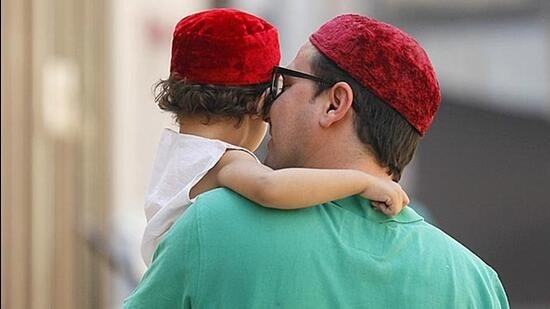The PARZOR Foundation ceased its involvement in the Jiyo Parsi scheme due to the government’s decision to implement direct beneficiary transfers
Article by Linah Baliga | Hindustan Times
Mumbai: The central government has last week introduced a fresh strategy to execute the Jiyo Parsi scheme, which is aimed at curbing the decline in the Parsi population of India, a significant number of whom live in Mumbai.
Jiyo Parsi, a central government scheme, was launched in 2013-14 to reverse the declining Parsi population by adopting scientific protocol and structured interventions to stabilise their population in the country. Through the scheme, Parsis receive financial assistance, especially low-income families who are not able to afford expensive medical treatment like IVF.
Hindustan Times – your fastest source for breaking news! Read now.
Under the new guidelines, beneficiaries will engage directly with the state government (district collector), after the Parzor Foundation, which was so far instrumental in implementing the Jiyo Parsi scheme, withdrew from the programme.
The new strategy entails that beneficiaries will get the funds directly into their account through the district-level committee with the district collector as the chairman. This committee will serve as a vital link between the Parsi community and the Government of India, ensuring the effectiveness of the interventions. It will organise counselling sessions and workshops to raise awareness about the scheme’s advantages.
The committee will accept proposals from applicants, assess them in collaboration with medical professionals/clinics, and endorse beneficiaries for treatment while also reviewing bills for reimbursement.
Meetings of the district-level committee will be held quarterly to review and recommend applications received for the Health of Child (HOC) component of the scheme. A provision of ₹50 crore was made from 2021 for the scheme and every year ₹10 crore will be spent till 2026.
Dr Adil Malia, trustee of the Bombay Parsi Panchayat, said, “What the government has done is that they will directly deal through the nodal officers of the government and the local panchayats because there are lots of people not necessarily staying in Mumbai but also staying in other parts of the country. So, it becomes better for the nodal officers to get in touch with local panchayats and directly deal with them and reach out. The amounts will be directly credited into the beneficiary’s account.”
He further added, “BPP represents the entire largest population of the Parsi in India. So according to me, 80-85% of the population in India resides in Mumbai and Maharashtra. That is why it will continue to play a large role in influencing the government in a positive way. This is a good move. The government has done a lot of research and it is a well-thought-out scheme.”
The Parzor Foundation ceased its involvement in the Jiyo Parsi scheme due to the government’s decision to implement direct beneficiary transfers without the need for intermediaries or NGOs. Advocacy and counselling services were halted in 2022. The recently launched scheme on Friday, last week, managed by the state and central government, mirrors the previous one. Parzor Foundation had to discontinue support for dependents, redirecting them to apply directly to the government.
Expressing concern, a source stated, “The Parzor team had gone to every town, every village, and city and spent years on it. They also provided personal counselling.”
Personal counselling was instrumental in supporting couples facing fertility challenges. Trained counsellors from Tata Institute of Social Sciences (TISS) were part of the disbanded team. The scheme facilitated marriage, medical treatment for disorders, and emotional support during fertility treatment, resulting in over 450 births between 2014 and 2022.
As per the newly reintroduced scheme, infertility is defined as the inability to conceive for over two years and presents a complex socio-psychological challenge. Parsi couples who have been blessed with children may apply for scheme benefits, which will be provided to duly verified applicants. However, funds will not cover maintenance, construction, or recurring expenses for facilities like crèches. The maximum number of beneficiaries for this component will be capped at 200. Elderly care will be monitored by district authorities to ensure respect for elderly family members by beneficiaries. Additionally, beneficiaries or their family members may pursue Avesta-Pahlavi language courses (two ancient Iranian languages) through distance learning from affiliated universities, with the ministry reimbursing annual fees up to a maximum of ₹6,000.
The government’s advocacy component involves a comprehensive outreach programme, including seminars, medical camps, publicity materials like brochures and films, and social media campaigns. This initiative, which will be undertaken by the state with the assistance of selected Parsi organisations, aims to raise awareness among the younger generation and couples of marriageable age. The goal is to address the population decline within the community by promoting early diagnosis and treatment. Additionally, digital advocacy will be utilised for wider outreach, while information about the Jiyo Parsi scheme will be disseminated through prominent Parsi newspapers and periodicals.
This scheme will now be under scrutiny by three committees. A state-level project monitoring committee will be established at the state level to oversee the implementation progress of the scheme. This committee will be chaired by the secretary of the department of minority welfare and include district collectors as members.
There will be a sanctioning committee, chaired by the relevant joint secretary, which will include a representative from the Ministry of Health and Family Welfare and the respective director/DS as convener. These committees will oversee the scheme’s implementation and address any issues that arise.
Lastly, there will be an oversight committee, chaired by the minister/secretary of minority affairs, and will include a representative from the Ministry of Health & Family Welfare and one from the state government. This committee will convene annually to evaluate the progress of the scheme’s implementation.

